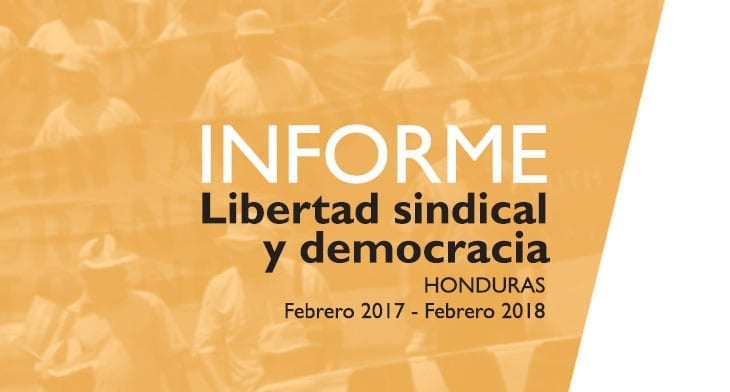
Mar 23, 2018
Two union activists were murdered in Guatemala and one in Honduras, while dozens of others were targets of violence—including threats of murder, kidnapping and stalking—over the past year, according to two reports released this week.
In Guatemala, “where the unionization rate is less than 1 percent, intolerance and violence against workers highlights, precisely, the mechanisms of terror to limit and, in many cases, to ignore those rights on the part of employers,” according to the Annual Report on Anti-Union Violence. The report, by the Network of Labor Rights Defenders of Guatemala (REDLG), found two more instances of violence in this reporting year (February 2017–February 2018) than in the previous period.
Since 2004, 87 union leaders and activists have been killed in Guatemala, one of the most dangerous nations in the world for union rights activists.
In Honduras, many of those targeted in the 39 documented instances of violence were organizing unions or seeking collective bargaining agreements in the agro-industrial palm oil sector in Colón, according to the report, “Freedom of Association and Democracy” by the Anti-Union Violence Network. Both networks are Solidarity Center partners. (The report is available in English, including an Executive Summary, and Spanish.)
Honduran Union Activist Targeted after Report Released
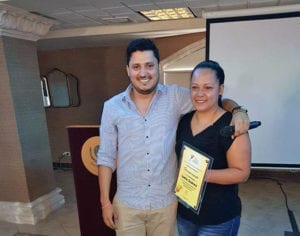
Isela Juárez is among Honduran union activists targeted with death threats. Credit: Anti-Union Violence Network of Honduras
Two days after the report on Honduras was released this week, union leader Isela Juárez, who has received death threats for her worker rights activism, was followed in a high-speed chase by two men on motorcycles before she took refuge inside the San Pedro Sula City Hall. Juárez, president of the Union of Workers of Municipal, Common and Related Services, (SITRASEMCA), also had been honored for her defense of human rights over the weekend.
The report on Honduras finds that 51 percent of the alleged perpetrators are public officials, including the military police, along with municipal authorities who harassed, coerced and fired nine workers to prevent them from forming unions.
Some 100 unionists and other members of civil society took part in the report’s launch, and several people violently targeted for their activism described their experiences. Since the network in Honduras began documenting cases of anti-union violence in 2015, 69 union activists have been targeted with violence, including seven who were murdered.
The report on Honduras also highlights a correlation between increased violence and the growing role of women in union leadership, and documents cases of unionists attacked during the post-election violence as they sought democracy.
In both countries, poverty and extreme poverty is high, with the World Bank estimating that in 2016, 65 of every 100 Hondurans lived in poverty, and 43 of every 100 in extreme poverty. In Guatemala, despite a growing economy, poverty rose to 59.3 percent in 2014.
The U.S. government has declined to consider anti-union violence in Central American Free Trade Agreement (CAFTA) complaints filed by the AFL-CIO and Guatemala and Honduran trade unions.
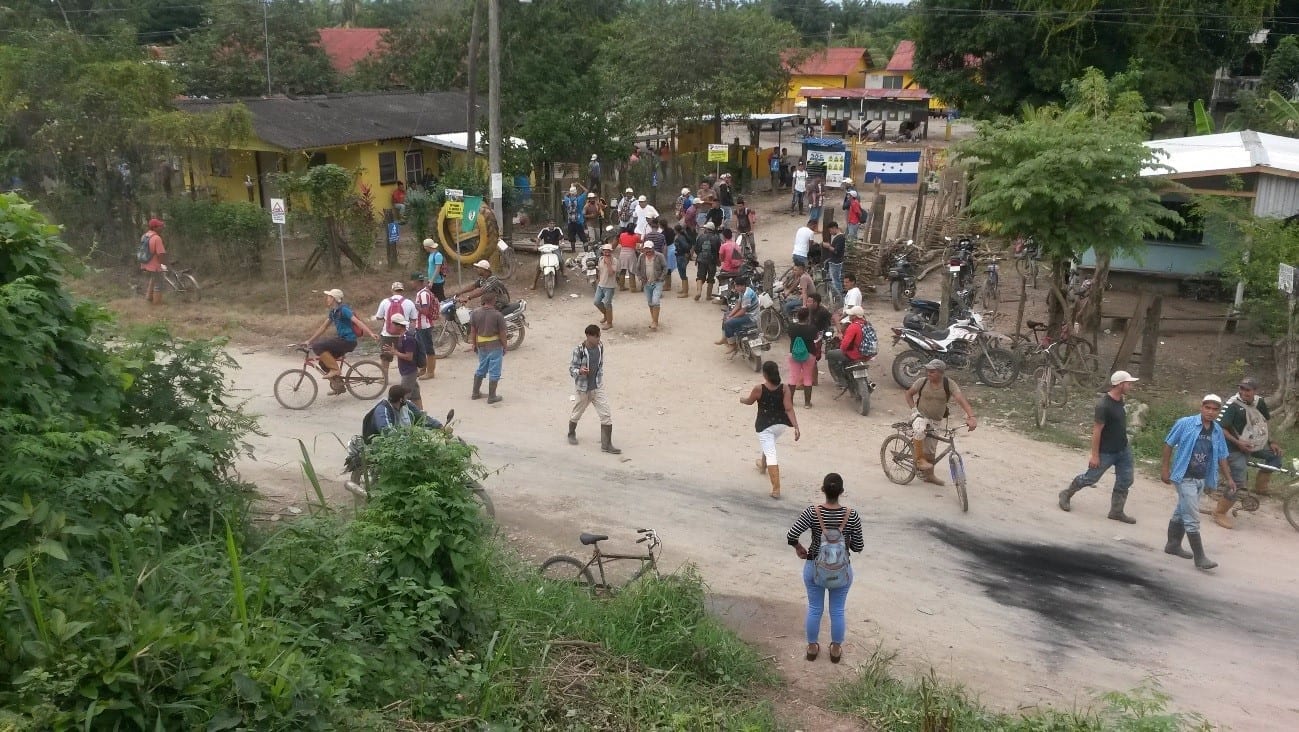
Dec 15, 2017
Several striking palm oil workers in Honduras were physically assaulted by private security guards and threatened with prison this week as they peacefully walked a picket line at company offices in El Progreso, according to the agro-industrial workers’ union federation FESTAGRO. The workers have been on strike since October, seeking to form a union in the face of stiff employer opposition.
Denouncing the attack, STAS, an agro-industrial union affiliated with FESTAGRO, says the company “is using violence to continue to violate the rights of workers” rather than initiate a serious dialogue.
The strike began October 20 when 160 palm oil workers walked off the job to protest the firing of 18 STAS-affiliated workers fired after workers indicated their intention to form a union. In early October, 80 palm oil workers had formed the country’s first-ever palm oil union, a move that sparked efforts by workers at other palm oil plantations to form unions.
The company went on to fire another 80 STAS-affiliated workers on November 2. Some 300 workers are now on strike and families are struggling to survive after nearly 70 days on the picket line.
According to FESTAGRO and the Honduran Network of Trade Unionists against Anti-Union Violence, after staff at a regional Ministry of Labor office conducted an inspection at the plantation in late November, a young FESTAGRO organizer was followed by a company vehicle when he later met with the Labor Ministry in the town of El Progreso.
Over the years, agro-industrial workers in the melon and banana sectors seeking to form unions with FESTAGRO, a longtime partner of the Solidarity Center, have been threatened, stalked and physically assaulted. The Anti-Union Violence Network, in which FESTAGRO is a key leader, also has documented murders of farm worker union activists, including those whose unions are members of the network.
The attack on the palm oil workers comes in the wake of violent repression against Hondurans protesting the country’s flawed elections. Honduran labor unions and human rights groups are demanding respect for human rights and transparency in the resolution of the country’s election crisis.
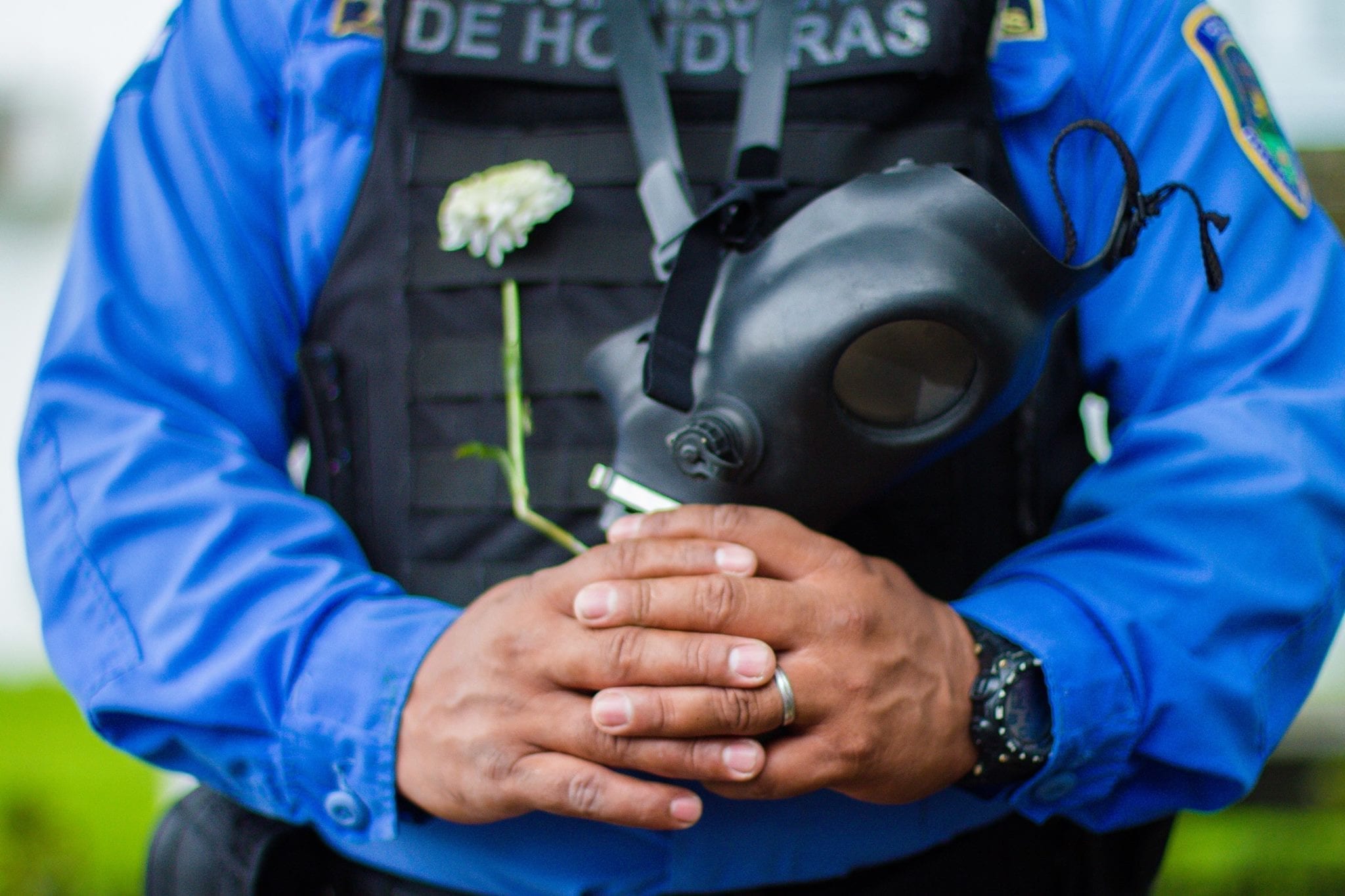
Dec 8, 2017
Honduras remains without a president nearly two weeks after elections marred by allegations of fraud, street protests and their violent repression, and Honduran labor unions and human rights groups are demanding transparency in the resolution of the crisis and respect for human rights.
“We demand unrestricted respect for the popular will expressed at the polls by the Honduran people on November 26 in a peaceful manner,” said three union federations—the United Confederation of Honduran Workers (CUTH), General Workers’ Confederation (CGT) and General confederation of Workers (CTH)—in a joint statement.
The Electoral Observation Mission of the Organization of American States (OAS) to the elections in Honduras has reported that the “lack of guarantees and transparency, as well as the accumulation of irregularities, mistakes and systemic problems that have surrounded this electoral process during the pre-electoral phase, election day, and the post-electoral phase, that as a corollary do not allow the Mission to have certainty about the results.”
The OAS has demanded that the government lift its curfew and conduct an exhaustive investigation into allegations of fraud. The government has since cancelled curfews in eight of 18 Honduran departments. The national police on Monday refused to enforce the nighttime curfew that day.
The Committee of the Relatives of the Detained and Disappeared in Honduras (COFADEH), a human rights defense group, has detailed 14 deaths (including children), 51 people injured and 844 arrests in what begin as peaceful protests. Thirty-eight protests around the country were violently quelled through tear and pepper gas, and conventional weapons.
The Electoral Commission has said it would recount more than 4,700 ballot boxes. Argentina, Chile, Colombia, Guatemala, Mexico, Paraguay and Peru said they supported a full recount of the vote.
In a statement issued today, the AFL-CIO also called for a complete recount that “must be observed by all political parties, civil-society organizations and international observers, such as the OAS and European Union missions that have raised reasonable questions about the November 26th election, subsequent vote-counting process and violent repression of peaceful assembly and expression. Failing such a recount, Honduras must conduct a new election, after taking effective measures to address the grave problems seen in the recent election.”
U.S. civil-society organizations have also issues a statement calling for transparency and for “Honduran authorities to refrain from any actions that would limit the ability of the Honduran people, journalists and social communicators, social movements and civil-society organizations to freely express their opinions and exercise their right to freedom of association and peaceful protest.”
On November 28, the State Department cleared the way for the Honduran government to receive U.S. foreign assistance, certifying that the country is fighting corruption and protecting human rights.
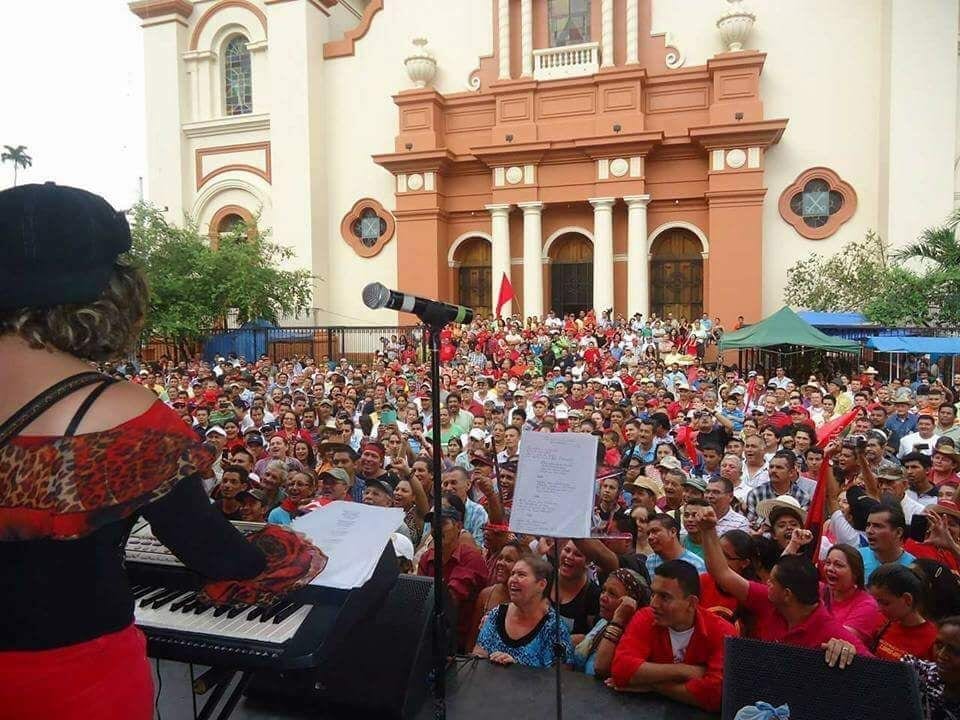
Dec 5, 2017
The Honduran Network of Trade Unionists against Anti-Union Violence is calling for a public recount of votes, an end to the violent repression of protests and international solidarity with the people of Honduras following a November 26 presidential election marred with irregularities.
In a statement, the Network, a human rights defense organization comprised of trade unionists, campesino leaders and rights defenders in Honduras, decried the “lack of transparency and delay in the declaration of the president-elect, [which] has generated a multidimensional crisis that threatens the peace of all Hondurans.”
The Organization of American States has said it cannot certify the results, which at first indicated a victory for the challenger, Salvador Nasralla, but, after stalling by the Electoral Commission, evolved into an apparent reversal of fortune for the incumbent, President Juan Orlando Hernández. As the Electoral Commission slowed the counting and its communications with voters diminished, Nasralla said his pledge to the OAS to respect the results of the referendum was invalid. A winner has yet to be declared.
Members of the National Police have refused to implement a curfew declared December 2, after thousands of Hondurans took to the streets to protest a halt in vote counting. Solidarity Center union partners report 10 people killed during earlier protests and large, peaceful gatherings today.
U.S. civil-society organizations have also issued a statement calling for transparency and for “Honduran authorities to refrain from any actions that would limit the ability of the Honduran people, journalists and social communicators, social movements and civil-society organizations to freely express their opinions and exercise their right to freedom of association and peaceful protest.”
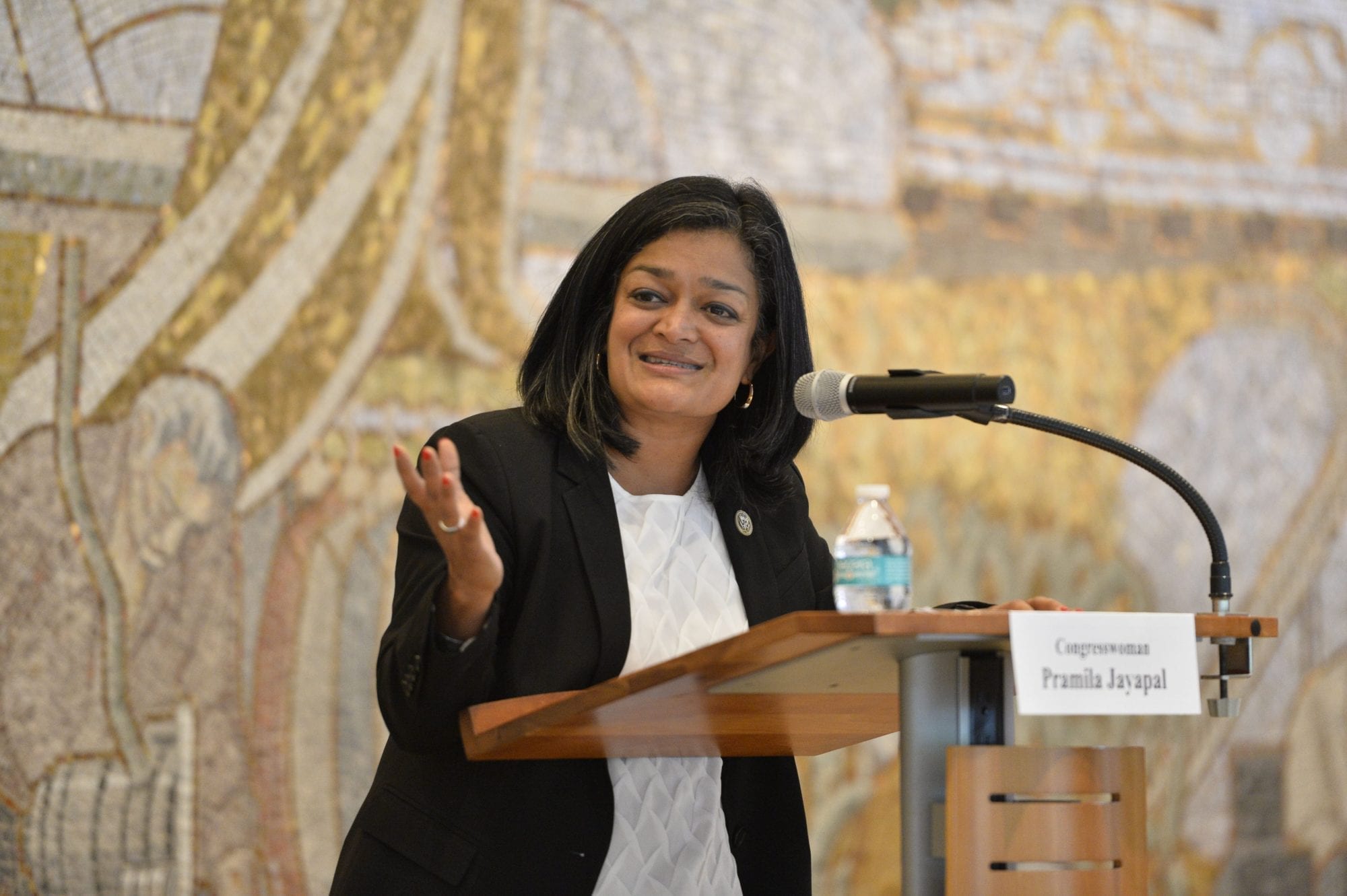
Nov 15, 2017
“Informal workers are organizing and they will organize as long as there is injustice and oppression,” says Sue Schurman, distinguished professor of Labor Studies and Employment Relations at Rutgers University.
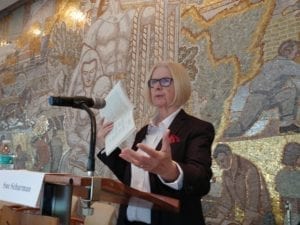
Sue Schurman, distinguished professor of Labor Studies and Employment Relations at Rutgers University, opened the Solidarity Center book launch. Credit: Solidarity Center/Tula Connell
Opening a Solidarity Center book launch and panel discussions on Informal Workers and Collective Action: A Global Perspective this morning, Schurman also cautioned that unless unions focus on the issues unique to empowering workers who have no direct employer, workers in the informal economy will organize to improve their rights “with or without the existing trade union movement.”
Hosted by the AFL-CIO, the event launched the Solidarity Center daylong 20th Anniversary Celebration in Washington, D.C., which will culminate tonight with a festive event honoring U.S. Sen. Sherrod Brown and the Colombian and Honduran labor movements. Rep. Karen Bass and AFL-CIO Secretary-Treasurer Liz Shuler will host.
Edited by Schurman, Adrienne E. Eaton and Martha A. Chen, Informal Workers collects case studies from union campaigns in such countries as Brazil, Cambodia and Colombia, bringing together in one volume a compendium of academic field research and concrete grassroots examples. The book was produced by Rutgers and WIEGO with support from the Solidarity Center.
Highlighting the event, U.S. Rep. Pramila Jayapal, the first Indian-American woman in Congress, energized participants with an impassioned call to action.
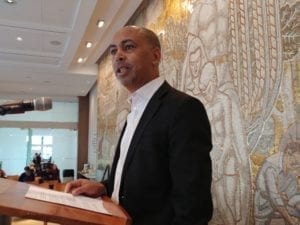
AFL-CIO Executive Vice President Tefere Gebre opened the Solidarity Center book launch on informal workers. Credit: Solidarity Center/Tula Connell
“This is about people standing up around the world and making it clear we have a very different vision,” she says. “It is about more jobs and better jobs for workers all over the world and that is the work of the Solidarity Center that we are grateful for.
“You are the ones who give me hope, working in countries around the globe in countries where organizing unions is sometimes life and death.”
“The work of the Solidarity Center around the world is very personal,” says AFL-CIO Executive Vice President Tefere Gebre, who addressed the opening session. “I was a refugee and dedicated my life to workers all across this country and world in support of their fights.”
A Broader, More Inclusive Labor Movement
Building a broader and inclusive labor movement by recognizing workers’ intersectionality is essential for unions to organize going forward, according to panelists.
“We can’t organize on the basis of class, or ethnicity, or gender—we must think about multiple identities,” says Janice Fine, associate professor of Labor Studies and Employment Relations, at Rutgers University.
Fine spoke on “Perspectives on Fighting for Social and Economic Justice for All,” the first of three panels.
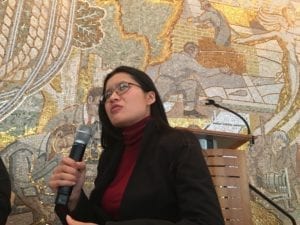
Mary Evans from Rutgers discussed how female Cambodia beer sellers improved their status as women in their communities by joining together to better their workplaces. Credit: Solidarity Center/Tula Connell
In Cambodia, where women beer sellers launched a grassroots social justice movement to improve their working conditions, and ultimately joined with unions, women have made tremendous progress in improving their status at work and in their communities, says Mary Evans, Labor Studies professor at Rutgers University.
“Beer worker women wanted dignity at work. There have been huge strides for women in Cambodia” where women have little status, she says.
Speaking about the need for unions to engage in “intersectional” organizing—inclusive, cross identity movement building, AFL-CIO International Director Cathy Feingold says, “ We need to build a campaign from the roots up, not at the place where we get stuck.
“Solidarity is multi-dimensional and horizontal,” she says. “We have to be saying, ‘I look you in the eye,’ not ‘I look down on you.’ ”
Speaking on the second panel, “The Impacts of Successful Organizing on Communities, Societies and Countries,” Evangelina Argüeta Chinchilla, National Coordinator at the General Workers Central (CGT) union confederation, described some of the challenges in organizing garment workers and negotiating bargaining agreements.
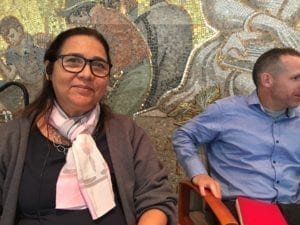
“Trade unions have been critical to the fight we are in”—Evangelina Argüeta Chinchilla, national coordinator at the General Workers Central (CGT) union confederation Credit: Solidarity Center/Tula Connell
“Trade unions have been critical to this fight we are in,” she says. “We have really been intentional about the unions being on the sideline in this struggle … and stand up to government and corporations and be the voice for the workers in this industry.” But the unions have not worked alone, she says. By partnering with women’s advocacy groups and anti-violence networks, unions have broadened their knowledge and expanded their allies in Honduras and around the world.
Argüeta and several Honduran garment workers will accept the honor award on behalf of the Honduran union movement at tonight’s 20th Anniversary Celebration.
Social Movement Unionism
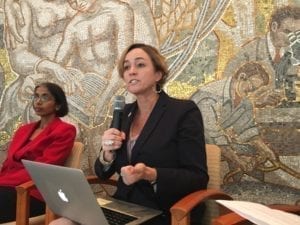
Solidarity Center Executive Director Shawna Bader-Blau described how Tunisian unions joined a countrywide movement for social justice. Credit: Solidarity Center/Tula Connel
Highlighting the Tunisian labor movement’s role in the 2011 Arab spring, Solidarity Center Executive Director Shawna Bader-Blau said unions initially played a supporting role to the grassroots opposition to dictator Zine El Abidine Ben Ali.
Later, the labor movement made a choice to shift its political support to the people, and by calling a national strike in which 100,000 union members took to the streets, the union movement facilitated the election of a democratic government.
“What the labor movement did was recognize itself in this movement. Bread, freedom and liberty—that’s what the labor movement is about.”
In Buenaventura, Colombia, where port workers were paid low wages with no social protections after their jobs were subcontracted, workers went on strike despite a law prohibiting them from doing so because they were not formally employed, says Dan Hawkins, research director at the Escuela Nacional Sindical in Colombia.
The strike, says Hawkins, empowered the Afro-Colombian community because “it symbolized to people in a racially discriminated city where all people in power are white or mestizo, the importance of port workers standing up for their rights.”
In the Dominican Republic, where informal economy workers have no legal right to form unions, domestic workers joined together in an association to work for their rights, says Fine, who shared the results of her case study from Informal Workers. The efforts of the primarily Haitian women workers were key to moving 2011 passage of International Labor Organization Convention 189 on domestic worker rights, expanding the possibility of decent work to domestic workers around the world.
Summing up the conference discussion, Jayapal says, “Ultimately we need to recognize we need to help workers around the world. We need to take on racism and sexism and xenophobia because that’s what will make the union movement strong.”











